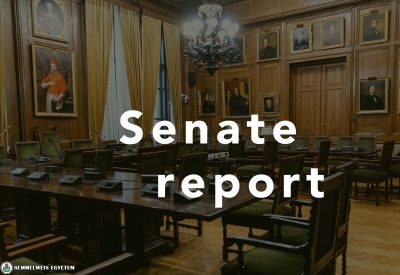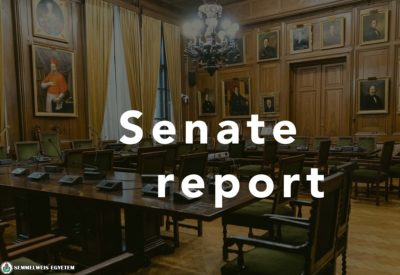At the beginning of the meeting, the body adopted the Senate’s meeting and work plan for the second half of 2021. The Senators voted in favor of the creation of the Directorate-General of Marketing and Communication, under the direct authority of the Rector, and the Directorate-General of Information Technology, under the direct authority of the Chancellor, in the framework of the amendment of the Organizational and Operational Rules (SZMSZ). The Directorate-General of Marketing and Communication will include the Directorate of Communication, the Directorate of Event Management and the Semmelweis Brand and Marketing Directorate, as well as the parts of the Directorate of International Relations responsible for international communication. The new directorate-general will be responsible for the overall PR and marketing activities of the university, which the management of the institution intends to strengthen. (For our article with Dóra Szepesi, Director-General of Marketing and Communication, click here.) The Directorate-General for Information Technology will perform the tasks of the Directorate for Information Technology, which has been separated from the Directorate-General for Technology, in order to give greater emphasis and a more efficient organizational solution to the operation and development of the University’s IT system in order to achieve the University’s strategic goals. A decision was also taken to include the provisions on the Semmelweis National Accredited Examination Center for Health and Social Affairs in the University’s SZMSZ.
The modification of the curriculum of the Faculty of Medicine, which affects the timetable for Microbiology I and II, and the introduction of the compulsory elective “Artificial Intelligence in Healthcare and Medical Science” at the Asklepios Campus Hamburg were supported. The proposal to place the Geriatrics Departmental Group under the Department of Internal Medicine and Oncology was approved.
The two-credit elective course “Csontváry on the Path of Hungarian Culture” will be launched again, offering 250 students the opportunity to participate in a series of thematic programs on Hungarian culture between 11 October 2021 and 10 December 2021. A decision was also taken to introduce the Semmelweis Symposium as a new optional subject. Participation in the university’s most prestigious academic event will be rewarded with credit.
The renewal of the composition of the Review Committee was approved, following the expiry of its mandate in October.
A decision was taken to merge the Department of Transplantation and Surgery into the 1st Department of Surgery and Interventional Gastroenterology as of 1 October. The two departments will continue to operate as a single institution under the name of the Department of Surgery, Transplantation and Gastroenterology, retaining their former sites but with a unified professional structure. The capacities, in particular those for surgery, interventional gastroenterology and transplant surgery, as well as the related bed numbers and specialties, will remain unchanged. The main rationale for the organizational change is to develop and enforce a common methodology of care, which will facilitate knowledge transfer and enhance medical-scientific synergies.
The modification of the rules of procedure of the Committee for Drug Therapy, Antibiotics and Infection Control was adopted and the new composition of the Committee was voted on; Dr István Takács, Director of the Department of Internal Medicine and Oncology, was elected as its chairman.
The Department of Health Promotion Methodology at the Faculty of Health Sciences will be established on 15 October. The main task of the new department will be the academic representation of electronic tools and solutions in the field of education, research and innovation, which are increasingly emerging in the healthcare sector.
They decided on the awarding of honorary titles of lecturer, including private lecturer, professor, associate professor and master teacher, reviewed current applications for senior lecturer and lecturer positions, and decided on this year’s Innovation Award winners in the TDK, PhD and research categories.
Senators approved the new Semmelweis University Design Manual. The redesign and modernization of the University’s coat of arms, logos and the University’s branding manual was carried out by the Semmelweis Brand and Marketing Directorate. Once approved, the development and uploading of user-friendly templates to the website will begin. The next step in the multi-phase project will be the redesign of the coats of arms and small logos of the six faculties, followed by the development of rules and creative for events.
A decision was taken to create the Semmelweis University Sports Scholarship, which aims to develop the university’s sporting life. The scholarship is open to students with an active legal status and at least one year of continuous membership in the Semmelweis University Sports Club, according to the rules to be laid down in the Student Fee and Allowance Regulations to be proposed at the next Senate meeting. The winner may receive a monthly scholarship of HUF 50, 100 or 150,000 for 5 months.
Pálma Dobozi
Translation: Tamás Deme
Photo (featured image): Attila Kovács – Semmelweis University


